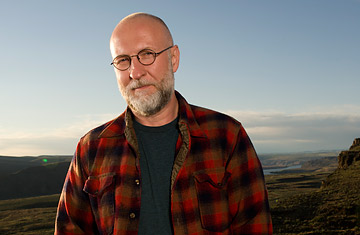
Bob Mould
Bob Mould's See a Little Light may seem like a modest contribution to the genre of rock-and-roll memoir. It's not the most high-flying account you'll read (Mould's fame was relatively modest); nor the most tragic (no band mates succumb to overdoses); nor is it the most debauched (no trashed hotel rooms). But it's also far better than many of the books that outperform it in those categories. Mould's smart and crisp account of his career as a rock pioneer-hero (co-written with rock journalist Michael Azerrad) is less about the familiar foibles of the performing life and more a touching tale of self-discovery and finding middle-aged happiness in the wake of a tormented youth.
Mould's name will be instantly familiar to fans of his seminal 1980s punk rock band Hüsker Dü and his '90s alternative rock outfit Sugar. His guitar style — with chainsaw chords producing bright melodies — helped to define the postpunk sound, influencing everyone from the Pixies to Green Day to Nirvana. Kurt Cobain was a devout Hüsker fan.
While often catchy, much of Mould's music has a tormented quality, with wailing, funereal lyrics; his most bitter songs evoke a man frantically trying to claw his way out of a dark box. (Titles include "Poison Years," "Too Far Down" and "Helpless.") See a Little Light explains why. One reason appears in the book's opening pages, which describe the miserable upstate New York home in which Mould grew up. His "monstrous" father was an abusive alcoholic who would berate Mould's obese sister for her weight, and even hid a tape recorder in the living room to eavesdrop on the family when he was out.
That grim childhood planted the seeds of anger and misery that would grow into Mould's high-velocity, ear-splitting guitar playing and vocals (which at first were mostly shouting). His vehicle was Hüsker Dü, a trio founded in 1979 when he was in college in Minneapolis. Although the band would mature toward a more melodic, even poppy songwriting style, initially the Hüskers made their name through full-frontal assault, fueled by Mould's pill-popping and alcoholism (though he later quit drinking in his mid 20s for fear of replicating his father's tragic life). Hüsker Dü shows became the stuff of legend, including one infamous 1984 gig in Norman, Oklahoma, during which the band played a nearly hour-long version of a two-minute song, "just for the hell of it." ("The last forty-five minutes, I played one E chord on my guitar," Mould writes, leaving the crowd "just plain stunned.")
Something else was behind this rage and frustration: Mould was a gay man concealing that fact in a macho punk rock scene where he feared his sexuality wasn't welcome. Having grown up in a rural town and then a Midwestern city, Mould wasn't sure how to live a gay life: "I had no role models and no exposure to gay culture." The stereotype of a campy effeminate gay man "made me hate the fact that I was gay," he writes. Thus Mould wrote all his lyrics in gender-neutral terms — not only for fear of alienating his largely male audience, but also to avoid shocking his traditional Catholic parents back home.
Despite the angst, the Hüsker years were also filled with fun and travel: pot-smoking sessions with William S. Burroughs, a weird appearance on Joan Rivers' late-night talk show, a stay at Michael Stipe's Athens, Georgia, home (where Stipe curiously insisted that certain guests come and go only through the window). But just after graduating from indie cult-sensation status to a major-label deal with Warner Bros., the band fell apart in 1987 when Mould, fed up with the drug use and general goofiness of his chief collaborator Grant Hart, called it quits.
